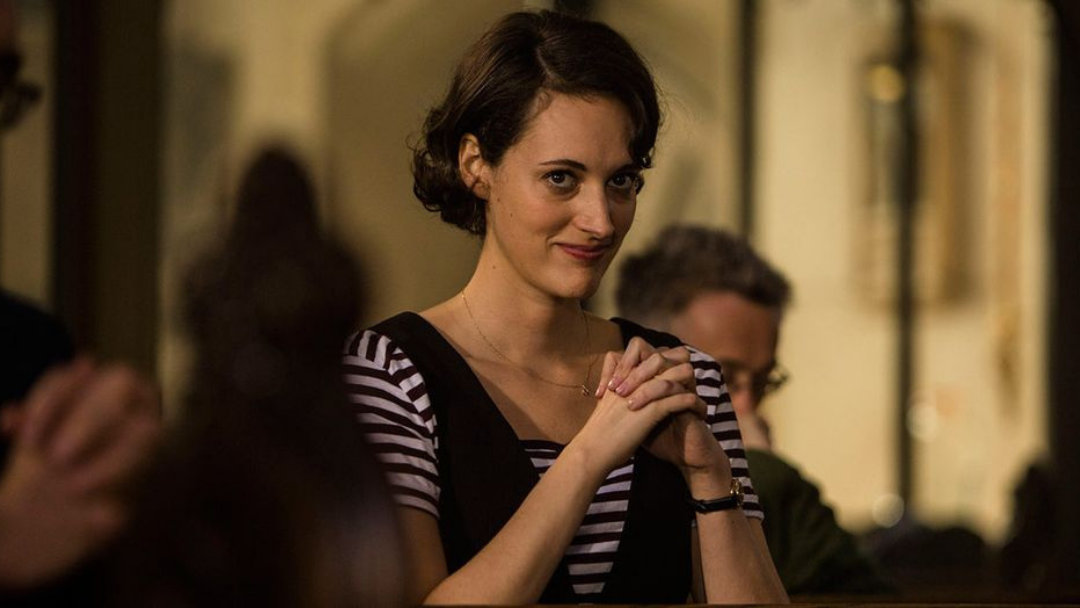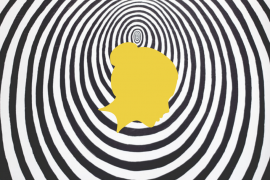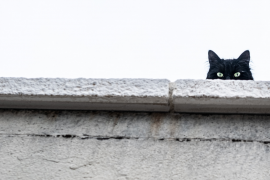Maybe you don’t know what the nights are like
for people who can’t sleep.
They all feel guilty—
the old man, the young woman, the child.
They’re driven through darkness as though condemned.
– Rainer Maria Rilke, The Book of Hours
The imperative for Phoebe Waller-Bridge’s Fleabag is the same as that of Charlotte Bronte’s Jane Eyre—the duty to be good. The rule itself is simple enough, but the execution can be, in more ways than one, fatal. The parallel between these two heroines might appear strange to anyone familiar with these stories, the former a BBC comedy about a self-loathing young woman struggling to cope after her best friend’s death and the latter a Victorian coming-of-age novel about an orphaned girl who rises to a respectable status as a governess. These two narrators, however, have far more in common than it may seem, not just because of their shared affinity for addressing their audiences directly and withered senses of self-worth. Both narrators confront religion, desire, and condemnation throughout their stories, and each woman is conditioned to believe that she is in some way unworthy or wicked, stained from birth with some terrible defect that makes her irredeemable.
It’s not difficult to see how doctrines of inherent evil play upon both Jane and Fleabag’s spirits, especially as they struggle to appease the patriarchal forces of morality around them. The child Jane, for one, takes her own wickedness to heart when the schoolmaster of Lowood, a school for orphaned girls, asks her, “‘What must you do to avoid [going to hell]?’” The text subsequently reads, “I deliberated a moment; my answer when it did come, was objectionable: ‘I must keep in good health, and not die.’” Indeed the only solution to Jane’s eternal damnation is the elixir of eternal life, which, regrettably, appears at no point in the plot of Jane Eyre. It’s scarcely imaginable that the sardonic Fleabag’s answer would have been any different, as she confesses in the show, “I have a horrible feeling that I’m a greedy, perverted, selfish, apathetic, cynical, depraved, morally bankrupt woman who can’t even call herself a feminist.”The question plaguing both of these narrators is ultimately how to be good, particularly when they possess some elusive germ of evil (“some vicious mole of nature”) that causes them to be and do just the opposite.
The desire to be good, then, is not enough for us. It’s clear that Fleabag wants to be a good sister and daughter, that she wants to be a feminist and an engaged citizen, that she deeply regrets her mistakes—perhaps the worst of all being that she is the woman with whom her best friend’s boyfriend cheated. It can seem so cruel, so unfair that we can spend our entire lives striving to be good people, toiling to discover the right way to live, the right god to pray to—but we are left still feeling sinful and inadequate. The question then becomes not simply How do I do good? but Why do I do evil when all I want is to do good? This is the moment when we begin to wonder whether or not we are cursed. This is when the feeling of our eternal condemnation encroaches upon us, and we truly despair. The problem isn’t that Fleabag doesn’t care enough to be a good person but that she has on some level accepted that she is fundamentally detestable and irredeemable. The problem is the distance between the drive to do good and the reality of the action, which are, at times, irreconcilable—the chasm between the will to be good and one’s nature.
And this will can seem so fickle when our narrators are as young and naive as Jane and Fleabag, as overwhelmed by the enormity of the lives that stand before them. They are both in some sense coming of age, Jane literally growing up and establishing herself in society and Fleabag reconstructing her life following her best friend’s and mother’s deaths. Through this, both narrators confront the insurmountable task of learning what it means to construct a life. This is where the issue of morality arises, as both women must decide what doctrine or system, if any, can lead them down the elusive “right path.” This is perhaps why both stories so masterfully demonstrate the important connection between the bildungsroman and a young person’s developing construction of how to live a good life—and if that can really be defined by ethical or moral standards. For Jane, coming-of-age means learning to live a disciplined life of servitude, while, for Fleabag, it means letting go.
It is also no surprise that religion is so prominent in both stories, as God is Jane’s one stronghold throughout all of her trials, and Fleabag is skeptical of religion but continues to wish there were a system that could tell her how to live rightly. The most terrifying realization, after all, is that no one, not even your parents or religion, can tell you how to live. This terror is no doubt why the confessional scene in Fleabag is one of the most poignant, where Fleabag admits to the Catholic priest who she’s incidentally fallen in love with:
I want someone to tell me what to wear in the morning. I want someone to tell me what to wear every morning. I want someone to tell me what to eat. What to like, what to hate, what to rage about, what to listen to, what band to like, what to buy tickets for, what to joke about, what not to joke about. I want someone to tell me what to believe in, who to vote for, who to love and how to tell them. I just think I want someone to tell me how to live my life, Father, because so far I think I’ve been getting it wrong, and I know that’s why people want people like you in their lives, because you just tell them how to do it. You just tell them what to do and what they’ll get out at the end of it, and even though I don’t believe your bullshit, and I know that scientifically nothing I do makes any difference in the end anyway, I’m still scared. Why am I still scared?
Indeed, we all want to live the right way, but such a task is insurmountably vague, and the suggestion that there is only one right path makes it even more elusive. We are berated by voices that usher us toward shame or religion or other cures for the human condition, each voice claiming to be the sole authority on the path to enlightenment. Our flawed narrators strive to be good people but, almost inexplicably, continually fail, searching for something outside of themselves that might grant them the answer of how to live.
But I’m convinced that this will always fail.
Such searching is based on a false premise, reliant upon the fallacy that there is only one right way to be a human being, only one path to goodness. It’s true that the most subjective, the most ill-defined question of all is how to be good, especially in the twenty-first century, where seemingly negligible actions have potentially global consequences. I can toil over how to be good; I can chastise myself; I can flock to the stronghold of religion—but none of this will ever be enough.
I think often about Franz Kafka’s posthumously published novel The Trial, wherein the tale’s protagonist, Josef K., is arrested in his home on the morning of his thirtieth birthday yet not told what crime he has committed. Importantly, Josef is not imprisoned but is allowed to roam free. He spends the entirety of the novel desperately trying to figure out what his crime is, obeying the bureaucratic process until he is completely dejected. All he knows is the feeling of condemnation, the certainty that he has done something wrong and is doomed by that wrong action. It is fitting, then, that the final scenes of the novel lead him to a cathedral and to a priest who tells him the parable “Before the Law,” wherein a man wishes to gain entry to “the law” through an open doorway, but the doorkeeper will not let him through. When, after many years of begging, the man asks the doorkeeper why no one else has come by all these years, the doorkeeper answers, “No one else could ever be admitted here, since this gate was made only for you.” Indeed Josef’s only crime is his obedience, his lack of faith not in institutions but in the Self. It is his subservience to society and to the law that engender his suffering.
None of us are refused entry to Eden—we simply refuse our own worthiness of being admitted there. Fleabag, Jane, and Josef all have in common their condition of condemnation, but they also have in common their innate, but unrealized, knowledge of the Self, the truth that the only path that exists is their own, each to their own Eden. As the poet Rainer Maria Rilke writes in his Letters to a Young Poet, “No one can advise and help you. No one. There is only one thing to do. Go into yourself.” Despite the disparate voices that try to advise and indoctrinate them, our narrators can come to no realization of what it means to be good, of how to live a life, without journeying into the Self.
Maybe the point, then, is not to simply strive to be good but to live authentically, to ensure that your life is your own. I cannot promise that my life will be unwaveringly selfless and righteous, but I can guarantee that it will be mine—if I have faith in the Self above all else. Then, imperceptibly, I might find through authenticity what is good and the answer of how to live. With such understanding, Fleabag’s desperate soliloquy would transform into a celebration of the Self’s knowledge, a recognition that, as the oldest Hindu text teaches, “The Self is Brahman, and Brahman is all,” that the ultimate reality lives within us.
ALICIA MANNO is an undergraduate student studying English and Chinese at the University of Nevada, Las Vegas. She has interned for several literary magazines, including The Believer and Witness Magazine, and helped found the first-ever undergraduate creative arts journal at her university.
Like what you’re reading?
Get new stories or poetry sent to your inbox. Drop your email below to start >>>
OR grab a print issue
Stories, poems and essays in a beautifully designed magazine you can hold in your hands.
GO TO ISSUESNEW book release
China Blue by Catherine Gammon. Order the book of which William Lychack Jeffries calls “a fiery declaration of all that is inexpressible about desire and loss and the need to find a home in a world in which even the most solid and real of things feel often less than completely solid or real.”
GET THE BOOK



